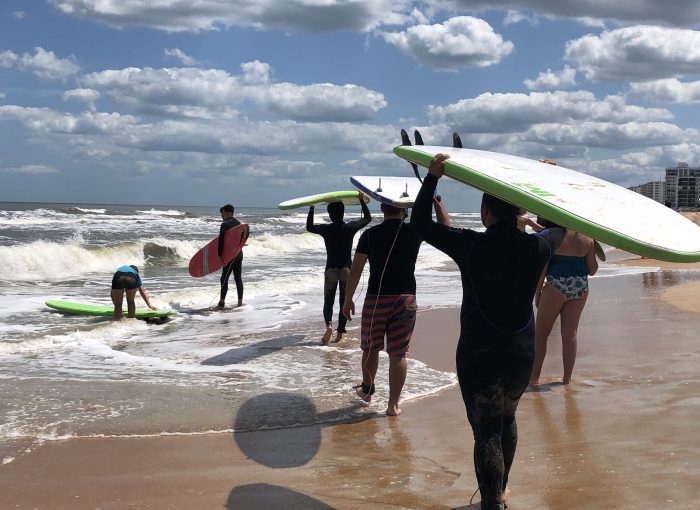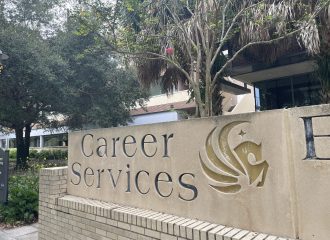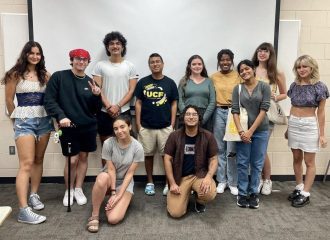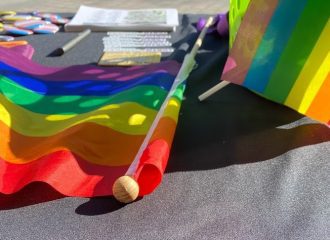by Lillian M. Hernández Caraballo
The Outdoor Adventure program may just be UCF’s best-kept secret.
A part of the larger UCF Recreation and Wellness Center (RWC), Outdoor Adventure serves students with a variety of physical activities that offer alternative opportunities for recreation and connection. Their focus is being as eco-friendly, educational, and inclusive as possible.
In other words, for students who may be tired of spending every Friday night at an Orlando club, perhaps a nighttime challenge course competition would sound like a nice change of pace. Or for those who may be trying to cope with the stresses of student life, renting out a kayak for a lone rowing excursion down a peaceful lake could provide some much-needed relaxation. The goal of the program is to offer outdoor experiences to those looking to break routine or enrich their college experience.
The physical challenges are but a part of the program; the results include skill-learning, team-building, and bonding. Program coordinator Katherine Rocco attested to the strong community that has formed around activities like the climbing tower. “It is very alternative to other sports. It is still physical activity but we’re engaging people from a lot of different areas and backgrounds, while providing recreation,” expressed Rocco during an interview. “Recurring participants build a community within that they wouldn’t have found elsewhere. Students from different places just seem to find a home at the climbing tower.” Other activities and facilities covered by Outdoor Adventure include the challenge course, hiking, whitewater rafting, camping, caving, backpacking expeditions, tubing, night paddling, SCUBA certifications and access to the Lake Claire Recreational Area, among many more. If any of this sounds interesting to you, then a visit to the Outdoor Adventure Center (OAC) should be your next stop.
Located within the RWC, the OAC serves as a sort of hub for the program. There, students can find the main offices and meet a friendly staff of coordinators, supervisors, and trip leaders who are available to provide orientation. At the OAC, students can also sign up for adventure trips as well as check out books, maps, and outdoor guides from their library. They can even rent equipment to plan adventure trips of their own. Some of the equipment available to students include backpacks, tents, stoves, sleeping bags, flashlights, kayaks, surf boards, water coolers, and more. Groups can walk out with everything they need for an outdoor adventure for under $35 dollars.
The main goals of the Outdoor Adventure program are to engage all kinds of students with different platforms for growth and learning and to connect students to each other and their natural environment. All of it is exclusive to UCF students and minds specific needs, such as affordability, flexibility, and safety. Therefore, these trips and activities are designed to be both inclusive and adaptive, so students do not need to be experienced athletes to enjoy themselves. The trip leaders are trained to make sure they can accommodate everyone, from beginners to experts.
Student lead and supervisor of Outdoor Adventure Carolyn Mitchell says the OAC is standing by with all the equipment and training necessary to extend trips involving activities such as adaptive kayaking, adaptive rock-climbing, and adaptive surfing to students with mental or physical limitations as well. One of the main goals of the program is to enable students who have the desire to engage in the outdoors but may lack the resources or capabilities to do so, according to Mitchell. “We have adaptive opportunities, so people who may be physically injured or somehow bodily or mentally disabled can participate,” Mitchell explained. “But inclusivity also extends to those who may lack resources like time or money to enjoy other hobbies and have experiences they otherwise wouldn’t have.”
For example, the OAC’s most popular trip, Learn to Surf, takes place twice every spring and fall semester and once in the summer. This scheduling makes it so different students have the chance to go. It is only $15 to sign up and that money covers trained instructors, safety equipment, transportation to Ormond Beach, surfing gear like boards and wet suits, and a setup at the beach with water coolers and a tent for shade. The trip is an excellent opportunity to relax and connect with other students, as well as, of course, learn to surf! Many of the students who participated in last spring’s event on March 31 said they enjoyed themselves and planned to do it again.
Some students, like Kevin Cardona, an 18-year-old marketing freshman, actually got to stand on their surfboards and ride the waves. He described the flow of the events at the end of the day. “It was a bonding experience,” Cardona said. “Everyone failed together, and everyone started figuring it out together. We cheered for each other.” He then added he would like to stay active within the OAC to eventually plan a second trip with a group. “If we can get the resources together, I would like to try something on our own.”
Mitchell also stressed what is perhaps the central theme of all OAC trips, the Seven Principles of Leave No Trace. She said that all the activities were held to the ethics guide of Seven Principles to enjoy the natural world in a sustainable way that minimizes or avoids human-created impact. Students are encouraged to connect not only with each other but with their surroundings as well on these trips so that they become active in the appreciation, preservation and protection of their local, natural resources and ecosystem.
Ultimately, the Outdoor Adventure program gives UCF students a place to safely encounter the world with the opportunity to reach new goals and enhance the experience of student life. All it requires are a willingness to trust yourself and a commitment to step outside of your comfort zone to discover just how far your abilities can go and excel.









